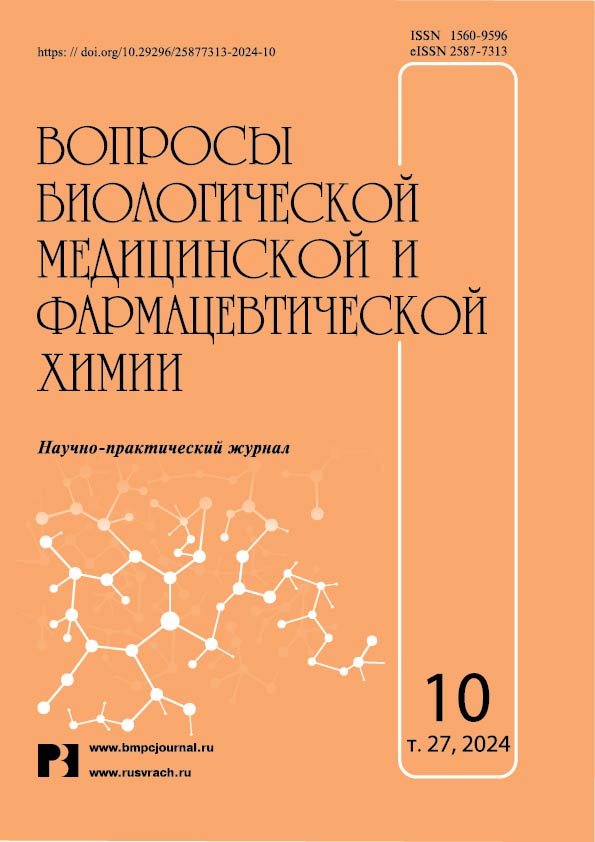Enzymes and metabolites of endogenous carbon monoxide in the fetoplacental system during physiological gestation and placental dysfunction
- 作者: Pogorelova Т.N.1, Sarkisyan О.G.1, Letunovsky А.V.1, Gunko V.O.1, Krukier I.I.1, Botasheva Т.L.1, Nikashina А.А.1
-
隶属关系:
- Rostov State Medical University
- 期: 卷 27, 编号 10 (2024)
- 页面: 27-31
- 栏目: Medical chemistry
- URL: https://journals.eco-vector.com/1560-9596/article/view/637327
- DOI: https://doi.org/10.29296/25877313-2024-10-04
- ID: 637327
如何引用文章
详细
Introduction. Prenatal ontogenesis largely depends on the functional and metabolic viability of the placenta and the entire fetoplacental complex. That is why the dysfunction of the placenta due to the changes in cellular regulation processes will lead to pregnancy complications and impaired fetal development. An important component of the system of intra- and intercellular regulators is the gas transmitter – carbon monoxide. Its role in cellular signaling and communication reactions, and at the same time, insufficient data of its metabolism, justifies the need to conduct research on this gas transmitter during complicated pregnancy.
The aim of the work. To study the features of the metabolism of the active cellular mediator - the gas transmitter carbon monoxide in different objects of the fetoplacental system during physiological pregnancy and placental dysfunction.
Material and methods. The research materials included placental tissue, amnion and amniotic fluid. The work uses spectrophotometric methods, enzyme immunoassay, and ion exchange chromatography.
Results. Multidirectional changes in the activity of the studied enzymes (heme oxygenase and histidine decarboxylase), the content of the substrate of Histidine reaction and the product of reaction of Histamine are established in case of placental disfunction. There is a certain correlation between the discovered studied components. Indicators of carbon monoxide metabolism can be markers for predicting postnatal damage – cerebral disorders in newborns.
Conclusions. The identified injuries are obviously important links in the chain of disorders accompanied by the development of placental dysfunction.
全文:
作者简介
Т. Pogorelova
Rostov State Medical University
编辑信件的主要联系方式.
Email: cugitang@gmail.com
ORCID iD: 0000-0002-0400-0652
Dr.Sc. (Biol.), Professor, Professor of the Department of General and Clinical Biochemistry № 1
俄罗斯联邦, 29 Nakhichevansky per., Rostov-on-Don, 344022О. Sarkisyan
Rostov State Medical University
Email: sarkisian_og@rostgmu.ru
ORCID iD: 0000-0001-5293-986X
Dr.Sc. (Med.), Associate Professor, Head of the Department of General and Clinical Biochemistry № 1
俄罗斯联邦, 29 Nakhichevansky per., Rostov-on-Don, 344022А. Letunovsky
Rostov State Medical University
Email: andrejletounovskij@yandex.ru
ORCID iD: 0009-0006-3477-8963
Ph.D. (Med.), Associate Professor of the Department of General and Clinical Biochemistry № 1
俄罗斯联邦, 29 Nakhichevansky per., Rostov-on-Don, 344022V. Gunko
Rostov State Medical University
Email: rniiap@yandex.ru
ORCID iD: 0000-0001-8607-9052
Ph.D. (Biol.), Senior Resercher at the Research Institute of Obstetrics and Pediatrics
俄罗斯联邦, 29 Nakhichevansky per., Rostov-on-Don, 344022I. Krukier
Rostov State Medical University
Email: biochem@rniiap.ru
ORCID iD: 0000-0003-4570-6405
Dr.Sc. (Biol.), Professor of the Department of General and Clinical Biochemistry № 1
俄罗斯联邦, 29 Nakhichevansky per., Rostov-on-Don, 344022Т. Botasheva
Rostov State Medical University
Email: t_botasheva@mail.ru
ORCID iD: 0000-0001-5136-1752
Dr.Sc. (Med.), Professor, Professor of the Department of Obstetrics and Gynecology № 3
俄罗斯联邦, 29 Nakhichevansky per., Rostov-on-Don, 344022А. Nikashina
Rostov State Medical University
Email: laigash@yandex.ru
ORCID iD: 0000-0001-8099-9093
Ph.D. (Biol.), Assistant at the Department of General and Clinical Biochemistry № 1
俄罗斯联邦, 29 Nakhichevansky per., Rostov-on-Don, 344022参考
- Olas B. Carbon monoxide is not always a poison gas for human organism: Physiological and pharmacological features of CO. Chemico-biological interactions. 2014; 222(5): 37–43.
- Strizhakov A.N., Ignatko I.V., Timohina E.V. i dr. Patofiziologija ploda i placenty. M.: GJeOTAR-Media, 2015. 176 с.
- Jansson T. Placenta plays a critical role in maternal–fetal resource allocation. Published in Proceedings of the National… 22 September 2016. Biology, Environmental Science, Medicine.
- Strizhakov A. N., Lipatov I.S., Tezikov Ju.V. Placentarnaja nedostatochnost': patogenez, prognozirovanie, diagnostika, profilaktika, akusherskaja taktika. Samara: Ofort, 2014. 239 с. (In Russ.).
- Zenclussen M.L., Casalis P.A., Hormonal F.J. et al. Fluctuations during the Estrous Cycle Modulate Heme Oxygenase-1 Expression in the Uterus. Front Endocrinol (Lausanne). 2014 Mar 13:5:32. doi: 10.3389/fendo.2014.00032. eCollection 2014.
- Fernandes H.S., Ramos M.J., Cerqueira N.M.F.S.A. The Catalytic Mechanism f the Pyridoxal-5'-phosphate-Dependent Enzyme, Histidine Decarboxylase: A Computational Study. Chemistry. 2017 Jul 6; 23(38): 9162–9173. doi: 10.1002/chem.201701375.
- Jutel M., Akdis M., Akdis C.A. Histamine, histamine receptors and their role in immune pathology. Clin Exp Allergy. 2009 Dec; 39(12): 1786–800. doi: 10.1111/j.1365-2222.2009.03374.x.
- West R.E. J.r, Zweig A., Shih N.Y., et al. Identification of two H3-histamine receptor subtypes. Mol Pharmacol. 2016 Nov; 38(5): 610–613.
- Pogorelova T.N., Drukker N.A., Krukier I.I. i dr. Disbalans placentarnyh ciklicheskih i aciklicheskih nukleotidov i modifikacija ih vzaimosvjazi s obmenom reguljatornyh gazotransmitterov pri prezhdevremennyh rodah. Rossijskij vestnik akushera-ginekologa. 2023; 23(5): 13–18. (In Russ.).
- Jekstrajembrional'nye i okoloplodnye struktury pri normal'noj i oslozhnennoj beremennosti. Pod red. V.E. Radzinskogo i A.P. Milovanova. M.: Medicinskoe informacionnoe agentstvo, 2004. 393 s. (In Russ.).
- Pogorelova T.N., Gun'ko V.O., Nikashina A.A. i dr. Posttransljacionnaja modifikacija i differencial'naja jekspressija belkov pri placentarnoj nedostatochnosti. Problemy reprodukcii. 2016; 22(6): 115–119; https://doi.org/10.17116/repro2016226. (In Russ.).
补充文件





